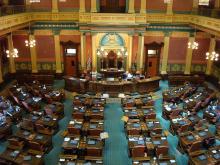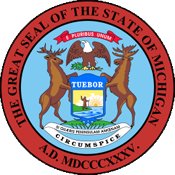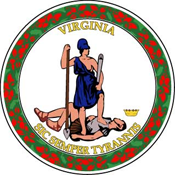
During this legislative session, state lawmakers in several states passed bills that allocated funds to broadband deployment and planning programs. In many states, elected officials are listening to constituents and experts who tell them that they need fast, affordable, reliable connectivity to keep their communities from dwindling. States that refuse funding to public entities, however, block out some of the best opportunities to connect people and businesses in rural areas. In places such as Michigan, Tennessee, and Virginia, states need to trust their own people to develop necessary broadband networks.
The Great Lakes State: Not Great at Supporting Local Broadband
Michigan’s HB 5670 caught the attention of community broadband advocates when it was introduced by Representative Michele Hoitenga in 2018. The bill was firmly anti-municipal network and after some investigation, it became clear that Hoitenga received guidance from lobbyists from big cable and telephone monopolies. HB 5670, with its sad definition of “broadband” and attempt to fork over state funds to big national ISPs didn’t go anywhere alone after word spread.
 Folks from the Michigan Broadband Cooperative (MBC) and other constituents in rural Michigan voiced their concern and the bill seemed to disappear. In reality, the House folded the language into SB 601, a large appropriations bill, which has now become law. Section 806 lists the types of entities that are eligible to receive grants from the $20 million set aside for infrastructure -- public entities are specifically eliminated.
Folks from the Michigan Broadband Cooperative (MBC) and other constituents in rural Michigan voiced their concern and the bill seemed to disappear. In reality, the House folded the language into SB 601, a large appropriations bill, which has now become law. Section 806 lists the types of entities that are eligible to receive grants from the $20 million set aside for infrastructure -- public entities are specifically eliminated.
In Michigan, places such as Sebewaing, and Marshall have already proven that local residents and businesses need gigabit connectivity and that they trust services from their local municipal utility broadband provider. The language of SB 601 as written will also prevent local governments from obtaining grants with which they could develop infrastructure for public-private partnerships. In Lyndon Township, the community is building a fiber network and working with a local cooperative for gigabit Internet access, but such an arrangement would prohibit Lyndon township from receiving any funding from the Michigan program, even though areas of the township were considered “unserved,” another grant requirement.
Tennessee Still Refusing to Follow Their Own Advice
Tennessee chose to dedicate $14.9 million to rural broadband this year via their Tennessee Broadband Accessibility Act, which passed in 2017. As in the case of Michigan, the Act includes a range of entities as eligible to apply and receive funding, including cooperatives, but specifically excludes municipalities and their municipal electric utilities.
In a 2017 article in Nooga Today, former Representative Kevin Brooks who now serves as Mayor of Cleveland, commented on the less admirable qualities of the bill:
When asked why it was more difficult to include city electricity providers, Brooks said it is about competition and money.
Allowing municipalities to offer services increases competition, but Comcast and other providers have said that it isn’t fair for them to compete against government entities such as EPB.
Last year, the corporations lobbied legislators and killed another effort for broadband expansion.
“We got the co-ops and we’re going to keep working on cities and municipalities,” Brooks said. “We are going to take what we can get … It’s a big deal.”
The Tennessee Broadband Accessibility Program still does not consider municipalities eligible to apply for funding two years later. When the state announced which applicants won the awards this year, Christopher commented the obvious on Twitter:
Great news! And without spending a taxpayer dollar you could bring fiber to 2x as many households by removing the prohibition on muni fiber expansion that was created to protect out-of-state monopolies. https://t.co/niNNIhcp29
— Christopher Mitchell (@communitynets) March 20, 2019
This year, state funding will go to 13 grantees, more than half of which are electric and telecommunications cooperatives, which is a plus, but the state of Tennessee is home to several munis that have the ability to expand to nearby communities but for state legal restrictions. Governor Bill Lee’s press release notes that the funds will be used to expand broadband to more than 8,300 households and businesses in 17 counties. Approximately $20 million in matching funds will add to the state investments.
Almost three years ago, the state Department of Economic and Community Development (TNECD) released a report to the former Governor on broadband accessibility and adoption. In that report, the TNECD recommended that state laws prohibiting municipal network expansion be lifted, but the state legislature still remains in the grip of big cable and telephone monopolies.
Rather than allowing local communities where fiber networks have proven benefits of economic development, public savings, and better access to education and healthcare, state leaders remain stubbornly faithful to large corporate ISPs. State lawmakers are willing to subsidize deployments by companies such as AT&T and Spectrum Cable, allowing shareholders from elsewhere to profit, but limiting competition. If Morristown's FiberNET or Tullahoma's LightTUBe could expand unrestricted beyond their electric service areas, bringing high-quality Internet access to rural residents and businesses would happen faster and keep precious dollars in the state.
Lobbyists in Virginia Control State Broadband Spending
This past session, freshman Delegate Bob Thomas, Jr., introduced HB 2141 in an effort to expand local authority for broadband funding and control. The state allows local communities to develop service districts, giving them the authority to create special taxing districts for necessary services, such as water, sewage, and garbage disposal. Rep. Thomas’s bill as introduced would have allowed local governments to do the same with broadband infrastructure, granting that authority under Sec. 15.2-2403. Powers of service districts. The Virginia General Assembly Legislative Information Services (LIS) summary of the bill as introduced reads:
Local services districts; broadband and telecommunications services. Authorizes a local governing body, with respect to a service district, to construct, maintain, and operate such facilities and equipment as may be necessary or desirable to provide broadband and telecommunications services.
The bill appeared to have support in the House, but lobbyists from the large corporate Internet access companies went to work in the Senate to erode any enthusiasm for the measure. They found a way to convince Rep. Thomas to amend the bill, persuading him that it was doomed to failure without changes.
The House passed the bill but when HB 2141 went to the Senate, lawmakers amended it further, specifying that only “nongovernmental broadband service provider(s)” could work with municipalities and other local governments to develop broadband networks. Lawmakers had extracted the heart of the bill and in conference committee, the Senate version won out. The final version that was passed by the General Assembly and will be adopted into law reads:
Local services districts; broadband and telecommunications services. Authorizes a local governing body, with respect to a service district, to contract with a nongovernmental broadband service provider who will construct, maintain, and own communications facilities and equipment required to facilitate delivery of last-mile broadband services to unserved areas of the service district, provided that the locality documents that less than 10 percent of residential and commercial units within the project area are capable of receiving broadband service at the time the construction project is approved by the locality.
 In Virginia, state law discourages municipal Internet networks with a series of burdensome reporting requirements and hurdles, and the Virginia rural broadband funding program locks out public entities. The Virginia Telecommunication Initiative (VATI) requires applicants to be units of government, but only accepts applications from them if they work with a private sector co-applicant. Only projects that bring Internet access to unserved areas can obtain funding through the VATI. Most troublesome, however, is the provision that prevents public entities from owning and operating a network funded through the VATI, even though they are expected to provide matching funds. Unfortunately, Rep. Thomas's bill did not amend either drawback.
In Virginia, state law discourages municipal Internet networks with a series of burdensome reporting requirements and hurdles, and the Virginia rural broadband funding program locks out public entities. The Virginia Telecommunication Initiative (VATI) requires applicants to be units of government, but only accepts applications from them if they work with a private sector co-applicant. Only projects that bring Internet access to unserved areas can obtain funding through the VATI. Most troublesome, however, is the provision that prevents public entities from owning and operating a network funded through the VATI, even though they are expected to provide matching funds. Unfortunately, Rep. Thomas's bill did not amend either drawback.
People in Virginia who support publicly owned broadband networks will continue to work to educate legislators before the next session. If the state removes existing barriers, local governments will be able to assist in bringing high-quality Internet access to unserved and underserved areas. Networks such as those developed by the Eastern Shore of Virgninia Broadband Authority (ESVBA), has already helped to connected areas once unserved and continues to expand, via its open access infrastructure.
The Department of Housing and Community Development (DHCD) manages the VATI program. Even if the DHCD chose not to award funding to local governments for broadband initiatives, municipalities, counties, and other public entities should be eligible to apply. No one knows the needs of the local population better than those who live there; by refusing their right to apply, the State of Virginia is leaving significant local knowledge untapped.
Feds Think Otherwise
While elected officials in some state capitals say they’re trying to solve the problem of the rural / urban digital divide, they’re establishing unnecessary hurdles for their constituents by locking public entities out of the funding process. State lawmakers are taking an outdated approach that even the federal government has abandoned.
 The Rural eConnectivity Pilot Program (ReConnect Program) through the USDA, makes $600 million available in a combination of grants and loans for rural broadband. In addition to traditional Internet access providers, co-ops, and other traditional broadband providers, tribes, states, local governments and other public entities can apply for funding.
The Rural eConnectivity Pilot Program (ReConnect Program) through the USDA, makes $600 million available in a combination of grants and loans for rural broadband. In addition to traditional Internet access providers, co-ops, and other traditional broadband providers, tribes, states, local governments and other public entities can apply for funding.
When states such as Tennessee, Virginia, and Michigan purposely deny local governments the right to bring better connectivity to their residents and businesses, they interfere with local matters. If the federal agency recognizes the intuitive vision of local communities, states need to follow suit.
Image of the Michigan House Chambers courtesy of Steve & Christine from USA [CC BY 2.0]







